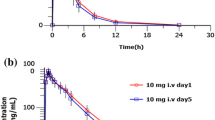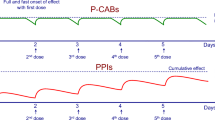Abstract
Lansoprazole is a newly developed proton pump inhibitor. The purpose of this study was to determine whether morning or evening dosage gave better control of 24-hr intragastric pH. In this study, we examined the antisecretory effect of lansoprazole by repeated intragastric pH monitoring on four occasions in eight normal subjects and compared median 24-hr pH values and pH threshold time of pH≧4 between morning and evening dosing, following the administration of lansoprazole 30 mg once daily in either the morning or evening for seven days. Intragastric pH was monitored before and after seven days of treatment. Both morning and evening dosing caused a rise in the intragastric pH. Median pH for 24 hr was 4.3 and 1.6 with and without lansoprazole morning dosing and 4.6 and 2.1 for evening dosing, respectively. The pH threshold curve shifted to the right with lansoprazole treatment in either case. However, no differences were found between morning and evening dosing in terms of median 24-hr pH values of pH threshold time of pH≧4. These results indicate that lansoprazole can be given once daily in either the morning or evening because of its potent and long-lasting antisecretory activity.
Similar content being viewed by others
References
Fellenius EB, Elander B, Wallmark B, Helander HF, Berglindh T: Inhibition of acid secretion in isolated gastric glands by substituted benzimidazoles. Am J Physiol 243:G505-G510, 1982
Olbe L, Haglund U, Leth R, Lind T, Cederberg C, Eckeved G, Elander B, Fellenius E, Lundborg P, Wallmark B: Effect of a substituted benzimidazole (H149/94) on gastric acid secretion in man. Gastroenterology 83:193–198, 1982
Fellenius E, Berglindh T, Sachs G, Olbe L, Elander B, Sjöstrand S-E, Wallmark B: Substituted benzimidazoles inhibit gastric acid secretion by blocking the (H++K+) ATPase. Nature 290:159–161, 1981
Bate CM, Wilkinson SP, Bradby GVH, Bateson MC, Hislop WS, Crowe JP, Willonghby CP, Peers EM, Richardson PDI: Randomized, double blind comparison of omeprazole and cimetidine in the treatment of symptomatic gastric ulcer. Gut 30:1323–1328, 1980
Prichard PJ, Rubinstein D, Jones DB, Dudley FJ, Smallwood RA, Louis WJ, Yeomans ND: Double blind comparative study of omeprazole 10 mg and 30 mg daily for healing duodenal ulcers. Br Med J 290:601–603, 1985
Lauritsen K, Rune SJ, Bytzer P, Kelbaek H, Jensen KG, Rask-Madsen J, Bendtsen F, Linde J, Højlund M, Andersen HH, Møllmann KG, Nissen VR, Ovesen L, Schlichting P, Tage-Jensen U, Wulff HR: Effect of omeprazole and cimetidine on duodenal ulcer. A double-blind comparative trial. N Engl J Med 312:958–996, 1985
Delchien JC, Isal JP, Eriksson S, Soule JC: Double blind multicentre comparison of omeprazole 20 mg once daily versus ranitidine 150 mg twice daily in the treatment of cimetidine and ranitidine resistance duodenal ulcers. Gut 30:1173–1178, 1989
Lind T, Cederberg C, Ekenvad G, Olbe L: Effect of omeprazole—a gastric proton pump inhibitor—on pentagastrin stimulated acid secretion in man. Gut 24:270–276, 1983
Ohara S, Hongo M, Asaki S, Sato A, Shibuya D, Sato H, Motojima T, Yamaguchi N, Ohara T, Tamura T, Sasaki H, Hirasawa Y, Watanabe K, Goto Y: The effects of famotidine and omeprazole on 24-hour intragastric pH of normal subjects. Jpn J Gastroenterol 85:1353–1359, 1988
Walt RP, Gomes MFA, Wood EC, Hogan LH, Pounder RE: Effect of daily oral omeprazole on 24 hour intragastric acidity. Br Med J 284:12–14, 1983
Emde C, Garner A, Blum AL: Technical aspects of intraluminal pH-metry in man: Current status and recommendations. Gut 28:1177–1188, 1987
Walt R: Twenty four hour intragastric acidity analysis for the future. Gut 27:1–9, 1986
Satoh H, Inatomi N, Nagaya H, Inada I, Nohara A, Nakamura N, Maki Y: Antisecretory and antiulcer activities of a novel proton pump inhibitor AG-1749 in dogs and in rats. J Pharmacol Exp Ther 248(2):806–815, 1989
Tateno M, Nakamura N: Phase I study of lansoprazole (AG-1749) antiulcer agent-Capsule form. J Clin Ther Med 7:51–62, 1991
Hongo M, Ohara S, Asaki S, Goto Y, Sakurada H, Shibuya D, Kimpara T: Analysis of ambulatory 24-hour intragastric pH monitoring-comparison of the effects of cimetidine 200 mg QID and 800 mg UID. Jpn J Gastroenterol 85:659–666, 1988
Piper DW, Fenton BH: pH stability and activity curve of pepsin with special reference to their clinical importance. Gut 6:506–508, 1965
Peterson WL, Barnett C, Feldman M, Richardson CT: Reduction of twenty-four hour gastric acidity with combination drug therapy in patients with duodenal ulcer. Gastroenterology 77:1065–1070, 1979
Fimmel CJ, Etienne A, Cilluffo T, Ritter C, Gasser T, Rey JP, Caradonna-Moscatelli P, Sabbatini F, Pace F, Bühler HW, Bauerfeind P, Blum A: Long-term ambulatory gastric pH monitoring: Validation of a new method and effect of H2-antagonists. Gastroenterology 88:1842–1851, 1985
Inatomi N, Nagaya H, Ishisaka Y, Satoh H: Effects of AG-1749 (lansoprazole) and its metabolites on acid secretion and experimental ulcers. Jpn Pharmacol Ther 19:477–486, 1991
Howden CW, Derodra JK, Burget DW, Silletti C, Dickey M, Hunt RH: Low dose omeprazole: Lack of consistent effect on intragastric acidity and nocturnal and stimulated acid out-put. Gastroenterology 90:1466, 1986
Müller P, Damman HG, Seitz H, Simon B: Effect of repeated once-daily, oral omeprazole on gastric secretion. Lancet 1:66, 1983
Sharma BK, Walt RP, Pounder RE, Gomez MDeFA, Wood EC, Logan LH: Optimal dose of oral omeprazole for maximal 24 hour decrease of intragastric acidity. Gut 25:45–64, 1984
Fellenius E, Elande B, Wallmark B, Helander H, Berglindh T: Inhibition of acid secretion in isolated glands by substituted benzimidazoles. Am J Physiol 243:G50-G51, 1982
Londong W, Londong V, Cederberd C, Steffen H: Doseresponse study of omeprazole on meal stimulated gastric acid secretion and gastrin release. Gastroenterology 85:1373–1378, 1983
Peden NR, Saunders JMB, Wormsley KG: Inhibition of pentagastrin-stimulated and nocturnal secretion by ranitidine, a new H2 receptor antagonist. Lancet 1:690–692, 1979
Wilson JA, Boyd EJS, Wormsley KG: Omeprazole inhibits nocturnal and pentagastrin-stimulated gastric secretion in man. Dig Dis Sci 29:797–801, 1984
Damman HG, Walter ThA, Müller P, Simon B: Intragastric acidity under 28-day omeprazole treatment. Hepatogastroenterology 32:191–194, 1985
Naesdal J, Bodeman G, Walen A: Effect of omeprazole, a substituted benzimidazole, on 24-hour intragastric acidity in patients with peptic ulcer disease. Scand J Gastroenterol 49:916–922, 1984
Author information
Authors and Affiliations
Rights and permissions
About this article
Cite this article
Hongo, M., Ohara, S., Hirasawa, Y. et al. Effect of lansoprazole on intragastric pH. Digest Dis Sci 37, 882–890 (1992). https://doi.org/10.1007/BF01300386
Received:
Revised:
Accepted:
Issue Date:
DOI: https://doi.org/10.1007/BF01300386




